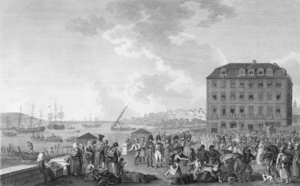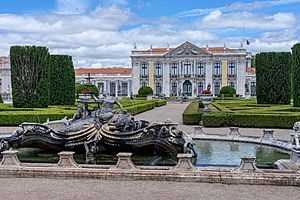Convention of Cintra facts for kids

The Convention of Cintra (also called Sintra) was an important agreement made on August 30, 1808. It happened during the Peninsular War. This agreement allowed French soldiers to leave Portugal without more fighting. The Convention was signed at the beautiful Palace of Queluz. This palace is in Queluz, near Sintra, Portugal.
Contents
Why the Convention Happened
French forces were led by General Jean-Andoche Junot. They were beaten by Anglo-Portuguese forces on August 21. These forces were commanded by Sir Arthur Wellesley. The battle took place at Vimeiro. After this defeat, the French found it hard to retreat.
However, new British commanders arrived. First came Sir Harry Burrard. The next day, Sir Hew Dalrymple took charge. Both men were older and had not fought much recently. Instead of pushing the French further, they decided to talk. Sir Arthur Wellesley wanted to block the French escape. He wanted to use his reserve troops. But he was told to wait. Talks between Dalrymple and French General François Kellerman led to the Convention being signed.
What the Agreement Said
The Convention allowed the French soldiers to leave Portugal. About 20,900 French soldiers were evacuated. They took all their equipment with them. They also took their 'personal property'. This might have included valuable items from Portugal. The British Navy transported them. They sailed to Rochefort, France. General Junot arrived there on October 11.
This agreement meant the French avoided more fighting in Spain. They also got free transport home. They traveled with all their belongings. This was different from a defeated army marching home lightly.
How People Reacted
Many people in the United Kingdom saw the Convention as a disgrace. They felt that the French should have been completely defeated. Instead, they seemed to escape easily. Dalrymple also ignored concerns about a Russian navy squadron. This squadron was blocked in Lisbon. It was allowed to sail to Portsmouth. Eventually, it returned to Russia. This happened even though Britain and Russia were at war.
Sir Arthur Wellesley had wanted to keep fighting. But he signed the first agreement under orders. He did not help negotiate the final Convention. He also did not sign it. However, Dalrymple's reports seemed to blame Wellesley. Wellesley was then called back from Portugal. Burrard and Dalrymple also returned to face an official inquiry.
The inquiry happened at the Royal Hospital Chelsea. It lasted from November 14 to December 27, 1808. All three men were cleared. But Wellesley soon returned to duty in Portugal. Burrard and Dalrymple quietly retired. They never served in the army again. Sir John Moore, another officer, said that Dalrymple was "confused and incapable." This showed how many people felt.
Cultural Impact
The famous poet Lord Byron wrote about the Convention. He mentioned it in his long poem, Childe Harold's Pilgrimage.
The Convention of Cintra is also the name of a pamphlet. It was written by William Wordsworth in 1808. He later became a Poet Laureate for Britain. Wordsworth also wrote a strong sonnet about it. He said it was "composed while the author was engaged in writing a tract occasioned by" the Convention. In his poem, he wrote about the suffering of "suffering Spain."
See also


